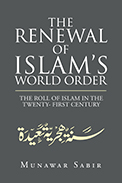
 |
The Renewal of Islam's World Order: The Roll of Islam in the Twenty-First Century
by Munawar Sabir
Trafford Publishing
Centered around the holy scripture of the Quran, the text is predicated upon the sanctity and righteousness of honoring the covenant with Allah that humans have entered into. In modern times, however, Sabir argues that the version of Islam being perpetuated in many parts of the world is somewhat misguided, leading to disharmony across every aspect and species of life. Even more emphatically, the author exclaims that the deceit and falsehood that in some cases has thrown the foundation of Islam into disarray is largely triggered by "the errors of the learned."
Though the book can be perceived as one that is strictly focused on the philosophical aspect and scripture, it is clearly evident that Sabir intends, and does so successfully, to demonstrate how every action that breaks from the covenant affects all of Allah's creations, from the environment to the individual. Specifically, the author cites English translations of the Holy Quran from respected scholars to highlight the prerequisites of a Muslim's responsibility of conduct: justice, fairness, and honesty.
Sabir's argument is further bolstered by traversing through history, beginning with the unconditional surrender of those who followed Ibrahim. Citing references like the Battle of Plassey where greed conquered freedom and the evolution of the Saudis as pawns of the "kafireen," the text depicts the history of Islam and the moment that the seeds of division were planted. As the work progresses, Sabir delves into the ummah of all Muslims, one that will create the unity of Islam worldwide. Sabir's thesis on the plight of twenty-first century Islam and the pathway to recreating the harmony of the covenant is infused with a clear-cut argument that provides readers an opportunity to sift through the complexities and gain clarity on the purpose and insight of Islam in modern-day times.